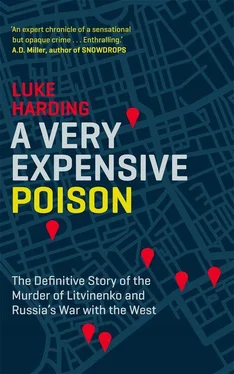And what of General Nechaev, the man who may have masterminded the Litvinenko operation? In December 2007, he died. He was fifty-six. Potemkin told Goldfarb he didn’t believe Nechaev’s death in Moscow was due to natural causes. Rather, it was punishment for the fiasco in London. Polonium was never meant to be discovered. Nechaev’s team was disbanded, Potemkin said.
The FSB posted Nechaev’s obituary on its website. The citation was brief. ‘Mikhail achieved significant results in the confrontation with foreign intelligence agencies,’ it wrote.
* * *
Back in Moscow, the intrusions at our apartment continued; the FSB would typically break in after I wrote something which displeased them. The UK Foreign Office raised my case privately with their Russian counterparts. The harassment would stop, only to resume a few months later. By 2010, I wondered how my Moscow assignment might end. Perhaps I would leave normally, when it was time to move on. Perhaps not.
My newspaper was on a roll: publishing a series of articles in collaboration with WikiLeaks, based on leaked US military logs from the wars in Afghanistan and Iraq. That autumn I flew back to London to take part in a third investigation. There was another leak. It was sensational – more than a quarter of a million secret and classified dispatches sent from the US’s embassies and consulates around the world, back to the US state department in Washington.
My task was to examine the cables on Russia and the former Soviet Union. There were 3,000 of them. I and other correspondents worked in an airless room – the air conditioning was broken – on the fourth floor of the Guardian ’s Kings Cross office. A search engine allowed you to enter a term that would spill out a set of results. You could also specify which US mission was of interest – Moscow, Paris, Berlin etc. I took a breath. I entered a search term – ‘Litvinenko’.
At a glance, the results were disappointing. The secret cables didn’t reveal who ordered Litvinenko’s murder; apparently Washington didn’t know. Or, if it did, this wasn’t a subject for diplomatic traffic. I looked again. Bingo! The most interesting material came not from the US embassy in Moscow but from elsewhere. I found the secret Madrid cable citing Litvinenko’s work for Spanish intelligence and his thesis that Russia was a ‘virtual mafia state’.
Another intriguing telegram came from the US mission in Paris. It suggested the White House believed Putin knew about, and probably approved, Litvinenko’s murder. Sent on 12 December 2006, it noted a meeting between the US assistant secretary of state, Daniel Fried and Maurice Gourdault-Montagne, a French presidential adviser to Jacques Chirac. The French blamed Litvinenko’s poisoning on ‘rogue officers’. They doubted the Kremlin was involved.
Fried disagreed: ‘Fried, noting Putin’s attention to detail, questioned whether rogue security elements could operate in the UK, no less, without Putin’s knowledge. Describing the current atmosphere as strange, he described the Russians as increasingly self-confident to the point of arrogance.’
There were other striking cables. I discovered that I wasn’t the only one suffering from covert FSB tricks. In 2009, the US ambassador John Beyrle, complained that ‘harassing activity against embassy personnel has spiked in the last several months to a level not seen in many years’. It included libellous attacks against US staff in the Russian media, and claims – made to family members – that their loved ones had met accidental deaths. Beyrle also said: ‘Home intrusions have become far more commonplace and bold.’
The Russia WikiLeaks material was terrific. It was known that the country suffered from corruption and misrule. The cables went further. They suggested the US shared Litvinenko’s gloomy conclusion that Russia had morphed into a full-blown kleptocracy run along mafia lines. In December, the Guardian ran a front-page story with the headline: ‘Inside Putin’s “mafia state”’. An article citing the Fried cable together with a photo of Litvinenko ran on page two. I was the author; they appeared with my by-line.
Before I flew to London the press and information department of Russia’s foreign ministry summoned me to a meeting. I’d been informed my press accreditation and visa would not be renewed. The British embassy succeeded in postponing this decision – I had to leave by December 2010 – for six months. This would give us enough time to pack up our home, find new schools for the children, and move back to the UK.
In the meantime, the WikiLeaks articles had enraged someone in the FSB, or the presidential administration, or both. In February 2011, I flew back from London to Moscow, and found myself dumped out of Russia. Officials from the Federal Migration Service cancelled my Russian visa, locked me briefly in a cell, and then escorted me back to the plane I’d just arrived on. My four years as Moscow bureau chief ended in expulsion.
9
Death of an Oligarch
Commercial court, Rolls building, Fetter Lane, London, October 2011
‘A genius gambler’
YULI DUBOV ON HIS FRIEND BORIS BEREZOVSKY, 2011
Eight months later, that October, I found myself inside London’s Rolls building. I was no longer reporting from Moscow. But, as with Litvinenko’s dramatic murder, it seemed that Russian feuds had a habit of spilling over into London. The building was Britain’s new commercial court. There was something in the air: the unmistakeable whiff of very large amounts of cash.
Up on the third floor I found two rival entourages. There were supporters in shiny suits, relatives, friends, PR consultants, journalists and a glamorous Russian woman dressed in black, her blonde hair piled into a chignon. There were lawyers, dozens of them. And there were bodyguards, outsize figures with earpieces.
At the centre of all this were two Russians. Once they were friends and business partners. Now they were bitter enemies. They walked separately into courtroom 26 and sat on opposite sides. One of them was a short, balding man in his mid-sixties, the possessor of an immense and restless energy, which compelled him to speak, move, fidget and gesture. His mind was said to be like a powerful computer. His mood – at this point sunny – was written all over his face.
The other was two decades younger, in his mid-forties. This second man seemed quiet, shy, calm and politely aloof. He appeared oblivious to the teeming drama around him. And sympathetic, too: with a boyish face, light beard turning grey, and a clear, open-eyed expression. His suit was smart yet understated. He sat placidly in one corner, listening to the proceedings via headphones, a reluctant participant with a bemused smile.
The first Russian was Boris Berezovsky. Berezovsky may have caused my departure from Russia, but this was the first time I had seen him. The second man was Roman Abramovich, owner of Chelsea football club in west London. Both were billionaires and among the richest people on the planet.
The dispute between the two of them was the biggest private litigation battle in UK history. At stake was an awful lot of cash. Berezovsky claimed that Abramovich had cheated him out of over $5 billion (£3.2bn). He said that he and Abramovich were partners back in the 1990s in the oil firm, Sibneft, and that he had been forced later to sell his share at a considerable loss. Abramovich denied the claim.
The case was more than a feud over billions. It was the latest instalment in the bitter decade-long public war between Berezovsky and Putin, Abramovich’s friend and political boss. Putin wasn’t in court but scowled above the hearings, which would go on for twelve weeks, like a malevolent ghost. The dispute was also about what exactly happened in the 1990s when President Yeltsin, in effect, gave away state assets to a handful of insiders, the oligarchs.
Читать дальше












